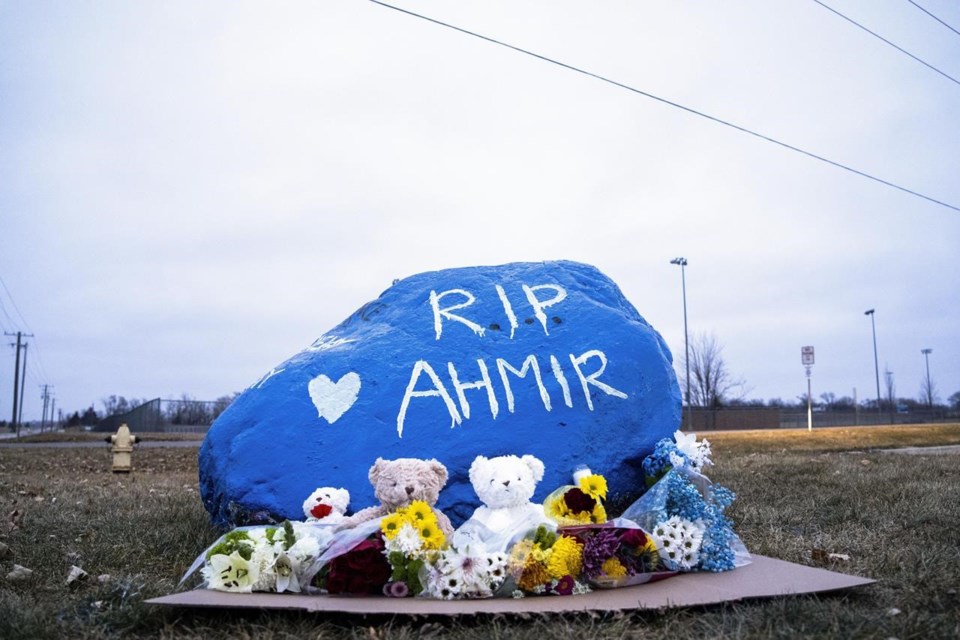Six months after a deadly mass shooting by an Army reservist, Maine lawmakers this week passed a wide-ranging package of new gun restrictions.
Three months after a fatal school shooting, Iowa lawmakers this week passed legislation allowing trained teachers and staff to carry guns on school property.
Two states. Two tragedies. Two different approaches to improving public safety.
“We live in two different Americas, in essence," said Daniel Webster, a health policy professor affiliated with the Johns Hopkins Center for Gun Violence Solutions.
“We see terrible acts of gun violence; no one wants them, of course," Webster said. "But we see this through different lenses.”
Legislatures in about 20 states already have passed measures this year to expand gun rights or restrict access to firearms. Dozens more proposals are pending. The divide continues a trend seen last year, when more than half the states enacted firearms legislation, with Democrats generally favoring more limits and Republicans more freedoms for gun owners.
LIMITS ON GUNS IN MAINE
Maine has a tradition of hunting and gun ownership. But after an Army reservist killed 18 people and wounded 13 others in Lewiston, Democratic Gov. Janet Mills called for a variety of new laws aimed at preventing dangerous people from possessing guns and strengthening mental health services.
Before adjourning its 2024 session early Thursday, lawmakers approved measures imposing a 72-hour waiting period for gun purchases, expanding background checks on private gun sales and criminalizing sales to certain prohibited people. They also passed a ban on devices that convert semi-automatic firearms into rapid-firing weapons like machine guns, and enhanced an existing law that allows judges to temporarily remove guns from people during a mental health crisis.
A gun safety coalition praised it as a significant step forward in response to constituents' concerns after the Lewiston shooting. But Republican state Sen. Lisa Keim criticized colleagues for “using the tragedy to advance legislation” that had been unable to pass previously.
GUNS IN IOWA SCHOOLS
In Perry, Iowa, a school principal and sixth-grade student died and several others were wounded when a 17-year-old student opened fire in January.
A 2021 state law already allowed schools to authorize individuals to carry firearms, though some districts have not done so because of concerns about insurance coverage.
The legislation given final approval Monday by the Republican-led Legislature builds upon the prior law by allowing teachers and staff who undergo gun safety training to get a professional permit to carry guns in schools. If they do, they would be protected from criminal or civil liability for use of reasonable force.
The legislation also requires large school districts to station a police officer or private security guard at each high school, unless the school board votes not to do so. Most of those school districts already have security staff.
DIVERGING STATE LAWS
Republican-led legislatures in Kentucky, Nebraska, South Dakota, Tennessee and Utah also passed measures this year that would expand the ability of some people to bring guns into schools. A bill passed in Wyoming allots $480,000 to reimburse schools for the cost of training employees to carry guns on school property.
Louisiana and South Carolina, led by Republican lawmakers and governors, each enacted laws allowing people to carry concealed guns without a permit. The National Rifle Association, which supported the measures, said similar laws now exist in 29 states.
By contrast, the Democrat-led Delaware Legislature passed legislation requiring people wanting to buy a handgun to first be fingerprinted, undergo training and obtain a state permit.
New Mexico Gov. Michelle Lujan Grisham, a Democrat, signed a pair of new laws imposing restrictions. One sets a seven-day waiting period to purchase firearms — more than double the three-day period required by the federal government for a background check.
Another new law in New Mexico prohibits carrying firearms within 100 feet (30 meters) of polling places, with an exemption for concealed-carry permit holders. Voting site restrictions on guns now exist in about one-third of the states and Washington, D.C., according to the gun-violence prevention group Giffords.
BUCKING PARTY TRENDS
Not all new gun policies diverge along partisan lines.
Republican Virginia Gov. Glenn Youngkin this year vetoed 30 gun-related bills passed by the Democratic-led General Assembly that he said would have trampled on constitutional rights. Yet Youngkin also signed some gun restrictions: One bans devices that convert semi-automatic handguns into automatic weapons. Another allows felony charges against parents who let a child have access to a firearm after being notified the child poses a threat of violence.
While signing several gun rights measures, Republican Gov. Mark Gordon of Wyoming also vetoed legislation that would have allowed people to carry concealed guns in public schools and government meetings. Gordon cited concerns the bill could have exceeded the separation of powers provision in the state constitution.
And in some cases, high-profile shootings have prompted lawmakers to avoid taking action on proposals they might otherwise have considered.
Missouri's Republican-led House had been prepared to debate bills exempting guns and ammunition from sales taxes and allowing people with concealed-carry permits to bring guns onto public transportation. But after the deadly shooting at the Kansas City Chiefs Super Bowl celebration, House Majority Leader Jon Patterson said those bills would not be brought up this year.
___
Associated Press writers David Sharp in Augusta, Maine, and Hannah Fingerhut in Des Moines, Iowa, contributed to this report.
David A. Lieb, The Associated Press



